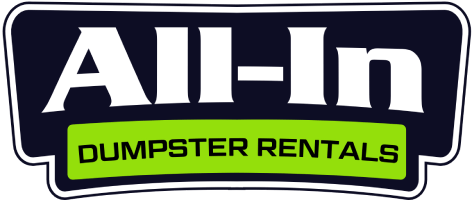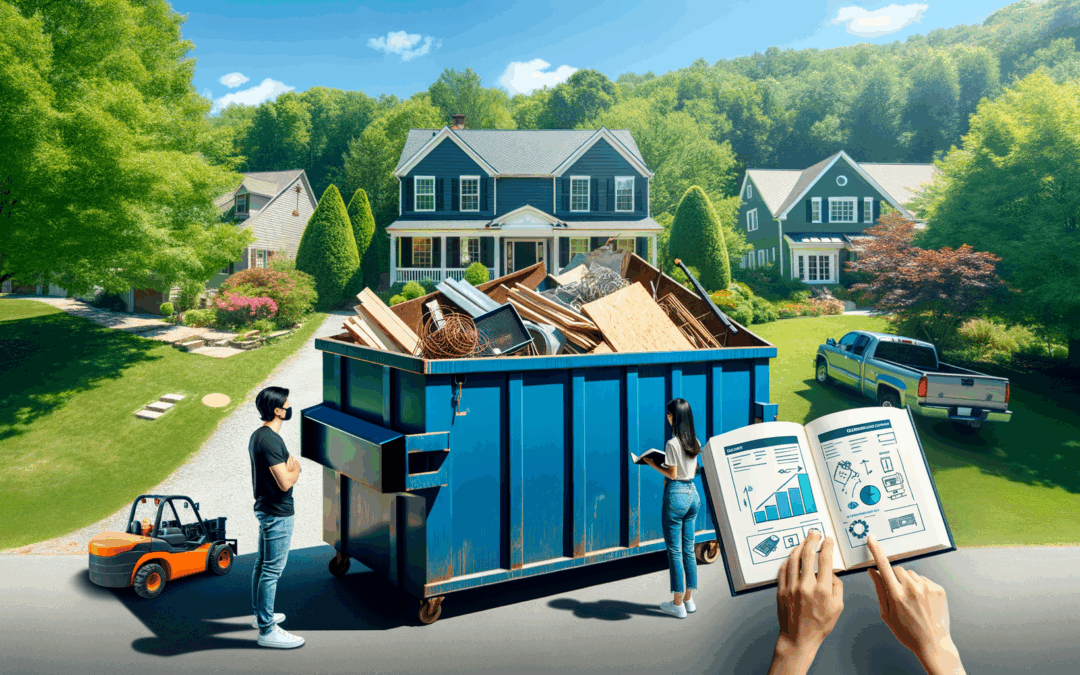Planning a home renovation in Asheville or Western North Carolina? One crucial aspect that’s often overlooked until the last minute is waste management. The mountains of debris that pile up during even modest renovation projects can quickly overwhelm your regular trash service. That’s where selecting the right dumpster size becomes not just a convenience, but a necessity for keeping your project on track and your property clean. Properly managing home renovation waste is essential for maintaining a safe and organized work environment. Failure to address this aspect can lead to delays and increased costs as you navigate piles of debris. By choosing the appropriate dumpster size, you can ensure your project runs smoothly while effectively handling all the home renovation waste generated along the way.
Here in the Blue Ridge Mountains, renovation projects come with unique challenges. Our hilly terrain, winding roads, and variable weather patterns mean that waste management requires a more thoughtful approach than in flatter regions. As your local dumpster rental experts serving Asheville, Hendersonville, Waynesville, and surrounding communities, we’ve guided countless homeowners through the sometimes confusing process of dumpster selection for renovations of all sizes.
Understanding which dumpster size will best accommodate your specific renovation needs not only saves you money but also prevents the headache of dealing with overflow or paying for unused space. Let’s dive into the essentials of matching your renovation project to the perfect dumpster size.
Assessing Your Renovation Scope: The First Step in Dumpster Selection
Before you can determine the right dumpster size, you need a clear understanding of your renovation project’s scope. Different projects generate dramatically different volumes and types of waste.
Small bathroom renovations typically generate between 1-2 tons of waste, while kitchen remodels can produce 2-3 tons. A whole-house renovation or addition might create 5-7 tons or more. Beyond just volume, consider the type of materials you’ll be disposing of – drywall, flooring, cabinets, fixtures, and possibly some landscaping debris all have different weights and densities.
In Asheville’s housing market, where many homes are older Craftsman styles, Victorian renovations, or mountain cabins, we often see unique waste challenges. Older homes might have layers of materials from previous renovations, while mountain properties might need additional space for cleared brush or landscaping waste.
Common Renovation Projects and Recommended Dumpster Sizes
Based on our extensive experience serving Western North Carolina homeowners, here’s a practical guide to matching your renovation project with the appropriate dumpster size:
10-Yard Dumpsters: Perfect for Focused Projects
Our 10-yard dumpsters are ideal for smaller, focused renovation projects. With dimensions typically around 12′ long, 8′ wide, and 3.5′ high, these containers work well for: home cleanouts, minor landscaping tasks, or small-scale construction jobs. To ensure you choose the right container for your needs, consult our comprehensive dumpster size guide, which outlines the various options available. This way, you can confidently select the perfect dumpster for your project. For those unsure about the right size, our easy-to-use dumpster size calculator can help you determine the best option based on the specifics of your project. This tool takes into account the volume of waste you expect to generate and the nature of the items you need to dispose of. With just a few clicks, you’ll gain insights that streamline your rental experience, ensuring efficiency and satisfaction.
• Single bathroom renovations
• Small kitchen updates (not full remodels)
• Flooring replacement for 1-2 rooms
• Small deck removals
• Moderate landscaping projects
These compact dumpsters are particularly popular in Asheville’s historic neighborhoods like Montford or West Asheville, where space between homes might be limited and streets can be narrow.
13-Yard Dumpsters: The Mid-Size Solution
For medium-sized renovation projects, our 13-yard dumpsters provide a versatile middle ground. These are particularly well-suited for:
• Complete kitchen remodels
• Multiple bathroom renovations
• Finishing a basement or attic space
• Garage cleanouts plus minor renovations
• Replacing all flooring in a medium-sized home
The 13-yard size has become increasingly popular with Asheville homeowners doing partial home renovations or updating vacation rental properties, as it balances capacity with accessibility.
15-Yard Dumpsters: For Substantial Renovations
When your project involves multiple rooms or significant structural changes, our 15-yard dumpsters provide the necessary capacity. These larger containers are appropriate for:
• Whole-house renovations
• Major additions to your home
• Complete roofing replacements
• Full-scale interior gutting projects
• Combined renovation and large cleanout projects
In areas like South Asheville, Arden, or Hendersonville where properties tend to be larger, these spacious dumpsters can accommodate extensive renovation waste without requiring multiple swaps.
Special Considerations for Asheville Area Renovations
Renovating in Western North Carolina comes with some regional considerations that impact your dumpster needs:
Seasonal Timing
Weather patterns in our mountain region can affect renovation timelines. Summer thunderstorms and winter weather events might extend your project duration, potentially requiring a longer rental period. If you’re renovating during our rainy seasons (typically spring and fall), you might want to schedule waste removal more frequently to prevent water-logging of materials, which can significantly increase weight.
Property Access
Many mountain homes have steep driveways, narrow access roads, or limited flat areas for dumpster placement. Our local knowledge of Asheville’s neighborhoods helps us recommend not just the right size but also the most practical dumpster type for your specific property configuration.
Historic District Requirements
If you’re renovating in one of Asheville’s historic districts, there may be additional considerations or permits required for dumpster placement. We’re familiar with local regulations and can help navigate these requirements.
Weight Limits: An Important Factor in Dumpster Selection
While size is the most visible aspect of dumpster selection, weight limits are equally important. Different renovation materials have vastly different weights:
Concrete, brick, and stone are extremely heavy – a small pile can quickly exceed weight limits. When renovating older Asheville homes with plaster walls or brick features, this becomes particularly relevant.
Roofing materials are deceptively heavy due to their density. A standard roof replacement on a 1,500 square foot home can generate about 3-4 tons of waste.
Wood, drywall, and general construction debris fall in the middle range. These mixed materials make up the bulk of most renovation waste.
Cabinets, trim, and fixtures are relatively light but can take up significant space due to their awkward shapes.
At All-In Dumpster Rentals, we take time to discuss your specific materials with you, helping estimate the weight to ensure you don’t encounter unexpected overage charges.
Cost-Effective Strategies for Renovation Waste Management
Making the most of your dumpster rental budget requires some strategic planning:
Proper Loading Techniques
Breaking down large items before loading can save tremendous space. For example, dismantling cabinets rather than throwing them in whole can reduce your needed dumpster size by 30% or more.
Place flat materials like doors, plywood, and drywall flat against the sides or bottom of the dumpster. This maximizes space and prevents unstable loading.
Load heavier items first and distribute them evenly across the bottom of the dumpster. This provides stability and prevents exceeding weight limits on one side.
Sorting and Recycling
Western North Carolina has a strong environmental ethos, and many renovation materials can be recycled rather than landfilled. Consider separating:
• Clean wood (can often be recycled or repurposed)
• Metals (appliances, plumbing fixtures, wiring)
• Cardboard and paper packaging
• Concrete (can sometimes be crushed and reused)
By reducing the volume of materials going into your dumpster through recycling, you may be able to use a smaller size, saving both money and environmental impact.
Common Sizing Mistakes to Avoid
After years of serving Asheville homeowners, we’ve observed some common pitfalls in dumpster selection:
Underestimating Waste Volume
The most frequent mistake is choosing a dumpster that’s too small, requiring additional hauls or a second dumpster – both of which increase costs. For first-time renovators especially, the amount of waste generated is almost always more than expected.
Forgetting About Staging Space
Renovation waste doesn’t appear all at once – it accumulates throughout your project. Without proper planning, early debris might fill your dumpster before you reach later demolition stages that generate even more waste.
Overlooking Weight Considerations
A dumpster might look only half full but could already be approaching weight limits if filled with dense materials like concrete or brick. This is particularly relevant in Asheville’s older homes where heavy materials are common.
Working with a Local Dumpster Provider: The Advantage
As a family-owned business serving the Asheville area, we bring local knowledge that national waste companies simply don’t have. We understand the unique challenges of renovation projects in our mountain communities, from the steep driveways of Woodland Hills to the historic preservation concerns in Biltmore Village.
Our drivers know the local streets, regulations, and even weather patterns that might affect your dumpster delivery and pickup. We can often suggest the ideal placement on your property based on our experience with similar homes in your neighborhood.
Most importantly, we provide personalized consultations to ensure you get exactly the right size for your specific project – not too large (wasting money) and not too small (causing headaches mid-renovation).
Planning Your Dumpster Rental Timeline
The timing of your dumpster rental can significantly impact your renovation experience. Here’s how to approach it:
Schedule delivery 1-2 days before major demolition begins. This gives you buffer time if there are any delivery delays or if you want to dispose of pre-demolition cleanout items.
For longer renovations, consider whether one dumpster for the entire project or sequential rentals for different phases makes more sense. For example, a demolition-phase dumpster followed by a finishing-phase dumpster.
Plan for weather contingencies, especially during Asheville’s variable spring and fall seasons when sudden storms can affect both your renovation timeline and waste management needs.
Making Your Final Selection
When it’s time to make your final dumpster size selection for your Asheville renovation project, consider these key factors:
The scope and scale of your renovation – be realistic about the amount of waste you’ll generate.
Your property’s access points and space constraints – especially important in our mountainous terrain.
The types of materials you’ll be disposing of and their relative weight and volume.
Your project timeline and whether you’ll need the dumpster for days, weeks, or through multiple project phases.
Your budget – balancing the cost of a larger dumpster against the potential expense of additional pickups if you choose too small.
Your renovation project deserves thoughtful waste management planning. By taking the time to select the right dumpster size from the start, you’ll create a smoother, more efficient renovation experience with fewer interruptions and unexpected costs. As your neighbors in Western North Carolina, we’re here to help make that process as simple as possible. Proper waste management not only keeps your project organized but also promotes a cleaner environment throughout your home renovations. By minimizing clutter and properly disposing of materials, you’re setting the stage for a successful transformation of your space. Together, we can ensure that your renovation proceeds without unnecessary delays or complications.
Ready to find the perfect dumpster size for your Asheville area renovation? Contact us for a personalized recommendation based on your specific project needs. Our local expertise ensures you’ll get exactly what you need – no more, no less – for a stress-free renovation waste solution.

